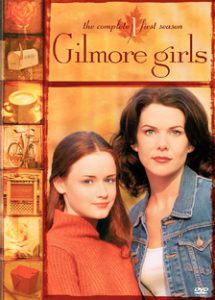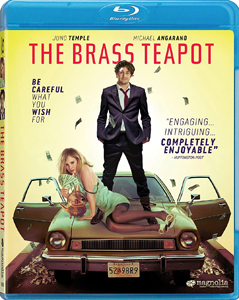“The Brass Teapot” (2012) is an exhibit in the case that there are more good actors than good screenplays. Indie queen Juno Temple and underrated everyman Michael Angorano (young Nicky on “This Is Us”) make this dark-comedy fantasy watchable, but they can only do so much with the thematically confused material.
Relatively light dark comedy
Riffing on the genie/magic lamp fable, writers Ramaa Mosley (who directs) and Tim Macy imagine what would happen if a couple came into possession of a magic teapot that gives them money for hurting themselves. They originally told the story in a comic book and a short film; the full-length film doesn’t justify its existence.
John (Angorano) is not only a telemarketer, but a bad one; Alice (Temple) spent $40K on an art history degree but can’t land a job at all. We’re supposed to feel bad for them.

To celebrate the 40th birthday of “Gilmore Girls’ ” Alexis Bledel, this month Reviews from My Couch is looking back at five of her movies that we haven’t previously reviewed.

“The Brass Teapot” (2012)
Director: Ramaa Mosley
Writers: Tim Macy (screenplay, story); Ramaa Mosely (story)
Stars: Juno Temple, Michael Angorano, Alexis Bledel
The two leads are naturally likable, though, and that balances out their characters’ generally idiocy and increasingly selfish actions for a while. But as their troubles – all self-inflicted — get worse, I liked them less.
The comedy isn’t great, but it’s still the reason to watch. Initially, the laughs are quick and amusing, like Alice getting a full Brazilian wax, leading to $100 bills shooting out of the teapot.
It gets darker when they purposely reveal painful information to colleagues – a cheating spouse, the death of a pet, etc. Oddly, it’s not funny enough to be offensive; it’s a light version of dark comedy.
Muddled money message
I think Mosley and Macy see money as evil (at least when it comes easy), but if so, they don’t make the case well. Every step of the way, John and Alice are in total control of their actions.
Once they erase their debt and make a little extra, they could get rid of the pot and be home free. There’s no catch. Steve Park’s Chinese mystic Dr. Ling repeatedly says he’ll accept the pot from them when they’re ready.
When John and Alice learn that the teapot produces cash in the proximity of other people’s pain, it clinches the couple’s lack of empathy. Alice argues that they’re “salt-of-the-earth good guys,” and I think we’re supposed to think they are. But their actions say otherwise.
Squandered supporting cast
Alexis Bledel (“Gilmore Girls”) is third-billed as Payton, but doesn’t get much to do other than be the mildly snobby rich girl whom Alice hates because, well, poor girls hate rich girls.

Bledel goes against her sweet girl type, but not strongly. Payton is who Rory Gilmore would’ve become had she gone all-in with Logan and embraced the worst stereotypes of rich-person behavior. Indeed, Rory shows she’s capable of these unappealing traits in Seasons 5 and 6. But, c’mon, she’s still sweet little Alexis Bledel.
Alia Shawkat (“Arrested Development”) is at the other end of the spectrum as poor (and non-teapot-gifted) Louise. Bobby Moynihan, who I hadn’t seen before, shows solid comedic chops as Louise’s husband. And sitcom veteran Jack McBrayer is perfectly suited to play an overly nice religious vegan.
“The Brass Teapot” should’ve given robust B-plots to these people. But no one exists outside of Alice’s and John’s world — which enhances our view that they are selfish.
That’s quite an accidental feat by the filmmakers, because John and Alice are a consistently loving couple, Angorano and Temple have romantic and comedic chemistry, and “The Brass Teapot” intends for them to be the good guys.
By stopping short of murder, they still are, the film tells us. But what starts off as a potential indie charmer develops an ugly sheen that it can’t polish off with its convenient ending.

